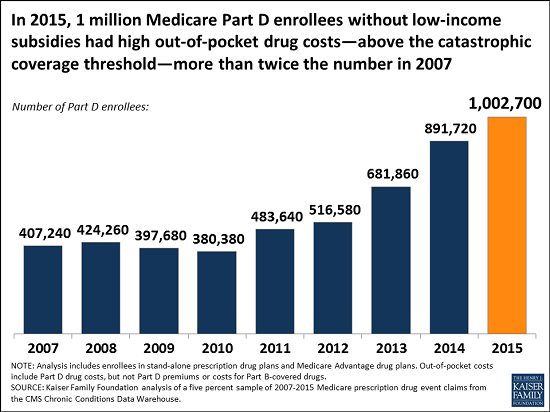|
Just Released
|
|
|
One Million Medicare Part D Enrollees Had Out-of-Pocket Drug Costs
above the Catastrophic Threshold in 2015
One million Medicare
beneficiaries had out-of-pocket drug spending above the Part D catastrophic
threshold in 2015, and the number with such high spending has risen sharply
in recent years, according to a new analysis by the Kaiser Family Foundation.
While the Part D drug benefit has helped make
drugs more affordable for people with Medicare, the lack of a hard cap on
annual out-of-pocket spending under Part D exposes enrollees to significant
costs, unless they qualify for low-income subsidies. The standard Part D
benefit includes a catastrophic coverage threshold above which enrollees pay
up to 5 percent of their total drug costs out-of-pocket.
In 2015, 3.6 million Medicare Part D enrollees had
total drug spending above the catastrophic threshold. The 2.6 million who
qualified for federal low-income subsidies were shielded from high
out-of-pocket spending on their medications, but 1 million enrollees faced
significant costs.
The 1 million enrollees who did not receive
low-income subsidies comprised just 2 percent of the Medicare Part D
population, but their spending accounted for 20 percent ($3 billion) of the
total $15 billion in out-of-pocket drug spending by Part D enrollees in 2015.
Together, these 1 million enrollees spent an average of more than $3,000 per
person out-of-pocket on their prescriptions, $1,215 of which was above the
catastrophic threshold.
The study, No
Limit: Medicare Part D Enrollees Exposed to High Out-of-Pocket Drug Costs
Without a Hard Cap on Spending, also found that, among Part D
enrollees in stand-alone drug plans with high out-of-pocket costs, those with
the highest average annual spending tended to have certain conditions,
including viral hepatitis, multiple sclerosis, leukemia and lymphoma, liver
diseases other than hepatitis, cystic fibrosis and cancer.
The study findings come at a time when the rising
cost of prescription drugs has emerged as a pressing issue for policymakers,
federal and state health programs, private insurers and consumers. With the
prospect of new high-cost drugs in the pipeline, alleviating the
out-of-pocket burden of prescription drug costs for a rising number of people
on Medicare remains an issue for federal policymakers to address.
Filling
the need for trusted information on national health issues, the Kaiser Family Foundation is a nonprofit
organization based in Menlo Park, California.
|
|
To be a Medicare Agent's source of information on topics affecting the agent and their business, and most importantly, their clientele, is the intention of this site. Sourced from various means rooted in the health insurance industry - insurance carriers, governmental agencies, and industry news agencies, this is aimed as a resource of varying viewpoints to spark critical thought and discussion. We welcome your contributions.
Tuesday, November 7, 2017
One Million Medicare Part D Enrollees Had Out-of-Pocket Drug Costs above the Catastrophic Threshold in 2015
Subscribe to:
Post Comments (Atom)


No comments:
Post a Comment